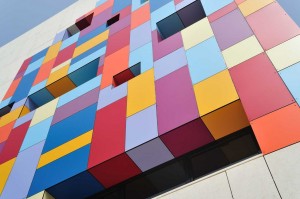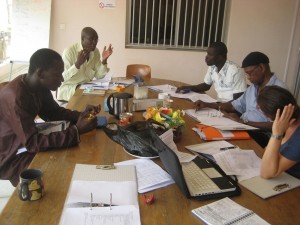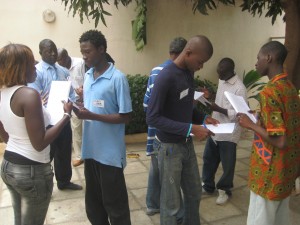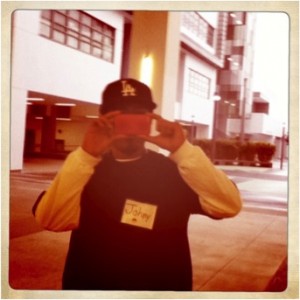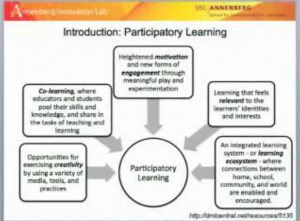In 2009, I began examining the intersections between new media literacies (NMLs; Jenkins, Clinton, Purushotma, Weigel, & Robison, 2006) and social and emotional learning skills (SELs; Collaborative for Academic, Social, and Emotional Learning, n.d.). I was a student in Dr. Henry Jenkins’s first seminar at USC, and the final paper was looming. I had recently been introduced, via Dr. Michael Cody, to Alexandre Rideau, the director of Senegal’s non-profit Reseau Africain d’Education pour la Sante (RAES) (or, in English, the African Network for Health Education). Alex wanted a proposal for revamping his youth communication for social change program, Sunukaddu. So I completed my assignment in Henry’s class by pitching a NML-rich modification to Sunukaddu for Alex, and adding in the dimension of SEL, which happens to be my passion.
Felt, L.J. (2009). Participatory learning methodologies for enriching an HIV/AIDS intervention to Senegalese youth: The Case for social and emotional learning and new media literacies. Unpublished manuscript.
Both boys bought it, and two important, collaborative relationships were born.
In terms of Alex and Sunukaddu… During the summer of 2010, I traveled to Senegal and spent two months co-designing and implementing Sunukaddu 2.0 with a group of extraordinary colleagues: Idrissa, Tidiane, Charles, and Amadou. Later, Brock also joined our brigade.
There was innovation on the educator level.
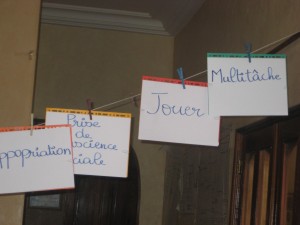
There was learning on the participant level.
Among both populations post-intervention, growth and advancement:
“You gave me self-confidence thanks to these skills” (Educator Tidiane Thiang, personal communication, September 22, 2010).
“…I saw [Sunukaddu participant] Mami who told me that she’s working in a retail establishment right now and [Sunukaddu participant] Azoupi is enrolled in a computer graphics workshop to become an editor. So, the training awakened vocational interests but also gave youths courage, the courage to take their destinies in their own hands” (Educator Tidiane Thiang, personal communication, October 18, 2010).
And on the communicative/scholarly level, a fair number of works produced (NOTE: The following list just details my efforts, not the textual, multimedia, and programmatic products developed by RAES):
PUBLICATIONS
Felt, L.J., Dura, L., & Singhal, A. (in press). Cultural Beacons in health communication: Leveraging overlooked indicators and grassroots wisdoms. In D.K. Kim, G. Kreps, & A. Singhal (Eds.), Global Health Communication Strategies in the 21st Century. New York: Peter Lang Publishing Group.
Felt, L.J. & Rideau, A. (2012). Our Voice: Public Health and Youths’ Communication for Social Change in Senegal. In M.O. Ensor (Ed.), African Childhoods: Education, Development, Peacebuilding, and the Youngest Continent (pp. 201-217). New York: Palgrave MacMillan.
Felt, L.J. (2010, July 29). Making education (double) count: Boosting student learning via social and emotional learning and new media literacy skills. eLearn Magazine: Education and Technology in Perspective.
PRESENTATIONS
Dura, L., Felt, L.J. & Singhal, A. (June 18, 2013). Cultural beacons: Grassroots indicators of change. Paper presented at 63rd Annual International Communication Association Conference, London, UK.
Continue reading


